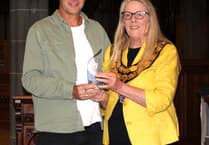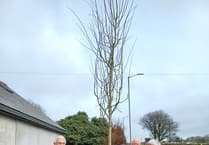A holiday park, which has come in for considerable criticism in a Cornish town, has fought back saying it’s not to blame for “everything that is wrong” in the area. Gwel an Mor said: “If you want to blame us for anything, blame us for wanting to boost local tourism and giving holidaymakers a quality experience in top-class accommodation.”
The holiday park, which provides luxury lodge accommodation overlooking Portreath on Cornwall’s north coast, hit back following a story we ran in which many local residents, including Portreath Parish Council, were critical of the park and its American owners Cove Communities. It says the reaction by locals may be “one of the finest examples of Nimbyism seen in England”.
Gwel an Mor has registered two applications with Cornwall Council – one to knock down ten lodges around a fishing lake and replace them with nine bigger and better dwellings, and another to build ten more lodges.
Residents cheered last month as Portreath councillors objected to both and there was much talk of piecemeal applications leading to expansion by stealth, with a view to accommodating over 1,700 residents at Gwel an Mor, the same amount as the rest of the parish. Councillors made it clear that they felt it would dwarf Portreath and any attempts to negotiate with Cove UK, a subsidiary of Cove Communities, had got nowhere. “They have never listened to anything we have said,” said Cllr Mark Hitchen.
We visited the village following the parish council meeting and spoke to businesses and residents. While many were vocal in their concerns about Gwel an Mor’s possible expansion and the effects that might have on sewage, flooding and “taking over the village”, others pointed out that it was good for tourism and brought in trade.
Gwel an Mor has now responded after our story was published nationally. A spokesperson said: “Everything that is wrong in Portreath is the fault of Gwel an Mor, or so we are led to believe. The streets of Portreath are covered in poo. The beach is empty. The town is being overdeveloped and it’s over-crowded. Over-crowded? How strange then that the man who owns the surf shop says there is a decreasing number of visitors and it’s the terrible weather that’s driving them away.
“It was also a complaint that owners were using Airbnb and that was a problem. Now that has ceased and that is a problem. Scott Treloar, who gave himself the nickname of ‘El Prezidente of Cornwall’ and has lived in his van on the opposite hillside from Gwel an Mor for three decades, says ‘people up there don’t spend their money in the village’. How odd, because we are also told that Gwel an Mor visitors are overcrowding the roads and causing parking issues.”
The spokesperson added: “Gwel an Mor have asked for planning permission from Cornwall Council to demolish ten lodges and build nine modern ones in their place, as well as build an additional ten lodges. A nice boost for tourism one would have thought. Portreath Parish Council don’t like this and many of the wildly inaccurate arguments outlined above seem to have influenced the councillors.
“This may be one of the finest examples of Nimbyism seen in England for quite some time. The objectors also can’t resist pointing out that the park is owned by an American company. Well, it’s worth noting that this American company, run from an HQ in England, employs 110 local men and women. So, if Gwel an Mor is such a blight on Portreath, let’s take a closer look at our modest contribution to the area.”
Gwel an Mor then listed the benefits it says it has brought to the area:
To date we have created 121 jobs – all employees are paid more than the Living Wage and all employees live in Cornwall, supporting their families and contributing to the local economy.
We work closely with local schools, colleges and organisations to bring people from all walks of life into work including the Cornwall Rural Community Charity Group; work coach placements for adults with higher needs, work experience placements from Truro and Penwith College; supporting people with disabilities through intensive personalised employment support into the workplace.
We spend £1.3million with local suppliers, tradespeople and companies – this excludes our council tax and business rates which contribute to the local parish council annual budget.
66 per cent of all our food and drink purchases are Cornish.
It also listed impacts it had made on the environment, including introducing plastic-free lodge kitchen amenities, which has seen a reduction of 95 per cent on its carbon footprint and 96 per cent reduction in single-use plastics, and the introduction of a shuttle service during peak season for guests at Gwel an Mor, reducing the number of cars in the village and the demand for car park spaces. So far around 125 to 150 visitors per week have used the service.
The holiday park has also implemented a conservation management plan in partnership with the Woodland Trust’s ancient woodland department and the Bat Conservation Trust to re-establish the native flora and fauna by removing invasive species of planting, such as laurel and rhododendron “to benefit our ancient woodland on-site”.
The spokesperson also stressed the park’s educational and social benefits, including its Feadon Farm Wildlife Centre, which is visited annually by 30 local schools as well as local wildlife clubs, “passing on the knowledge of our conservation and wildlife activities to the younger generation and encouraging them to create wildlife improving areas at home. For example, during the breeding season, we hosted native breed workshops and sent out 700 bird boxes to families in the local area”.
“We have installed a sensory play park – open to the local community, acknowledging the need for a place for families to be able to play together when one or more of the family members may have sensory needs or indeed be in a wheelchair. This helps families be together, whereas in other play parks, this is not catered for. This has been welcomed by the local community and guests alike.”
The spokesperson added: “It is also worth mentioning that we had several meetings with the local council where we shared our plans and asked for their help in distributing funds to local charities and good causes. Not only did we get no comment despite our repeated email requests but the information did not get passed on to the charities and local initiatives.”




